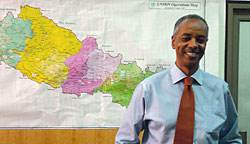 |
Prashant Jha: What is the UN's assessment of the present political situation in Nepal?
Tamrat Samuel: The current situation is one of stalemate. We recognise efforts are being made to resolve the stalemate. Unfortunately, as the Secretary General stated in his report, we can't say that the commitments made in the 7 July letter by PM Nepal to him have been implemented. This is regrettable, including from UN's point of view. UNMIN's mandate was framed in the context of the period before the Constituent Assembly elections. It has been over a year-and-half since the CA elections took place, and the mission is carrying out the residual aspects of the original mandate under significantly different political circumstances. What we would like to see is that agreements are carried out, integration is completed, and the constitution is drafted in a timely manner so we can finish the job we were given.
So do you think a new mandate, that reflects the changed political context, would help the UN perform its role better?
It is up to Nepal, the parties to the peace process, and the Security Council to determine that. As the UN, we respond to the needs of the country. There should be no sense that the UN has any different agenda or that UNMIN wants to stay on in Nepal. We are not looking for any additional business. But anything that spurs progress is welcome. To maintain the cantonments indefinitely, under UNMIN's light monitoring arrangement, while political tensions and the possibility of confrontation increase, is definitely not ideal. While UNMIN's monitoring has been an important factor and no serious breakdown has occurred, this arrangement was designed for a different period when parties shared greater mutual trust and confidence. The sooner there is progress on integration and related aspects and cantonments can be closed the better.
The Secretary General's recent report says that a national unity government is desirable. There has been criticism that this marks disrespect for Nepal's domestic political processes.
The criticism is not justified in any way. The report actually says "remains desirable". All the major Nepali actors have emphasised that a national unity government is important. In fact, PM Nepal told me in June that he was trying to get all the key parties into government. All the report does is reflect the general desire of the parties, and it is consistent with what the Secretary General has repeatedly said in the past about governance by consensus, maintaining the unity of the parties, etc. The report does not make any suggestion about the specifics of such a government. That is obviously for the parties to decide. To interpret this positive encouragement in the direction of a commonly held ideal as being a partisan view is not acceptable at all.
January is two months away, and there may be another request for UNMIN's extension. Will there be a roll-over of the mandate?
I'm sure the Security Council will be grappling with the issue of the future of the mission this Friday. It is up to the parties to decide the nature of UN assistance they request. The PM had given strong and encouraging indications that after the Dasain and Tihar holidays, there would be maximum effort to make progress on integration. There is time, and while it may be physically difficult to complete the process by January, with trust and confidence, progress is still possible.
What would you say to the Maoists, who have just started an agitation?
Our consistent message to all parties has been to adhere to solemn agreements, implement commitments, utilise the constitutional and political mechanisms available to them to resolve problems and to refrain from taking extra-constitutional steps that would impede rather than facilitate progress. This is the responsibility of all parties, and this is what we continue to say to the Maoists.
Have you been talking to India about the stalemate? Do you think neighbours can play a more constructive role to turn the situation around?
Nepal's neighbours are of course key partners, and India is a major player. Our consultation with them is quite important. They know our concerns about the present drift in the peace process. They have a closer engagement with stakeholders in Nepal. Our position is that the international community, including India, should send a message to Nepali actors that the peace process enjoys the support of the international community, that the fate of the peace process is in their hands, and whatever the international community does is to support the peace process and not to undermine it. There is complete respect for the national ownership of the process.
READ ALSO:
Peace in pieces - FROM 23 OCT 2009
Mandated monitoring - FROM ISSUE #374 (16 NOV 2007 - 22 NOV 2007)
Futile neutrality - FROM ISSUE #371 (19 OCT 2007 - 01 NOV 2007)
Into the fray - FROM ISSUE #331 (12 JAN 2007 - 18 JAN 2007)


